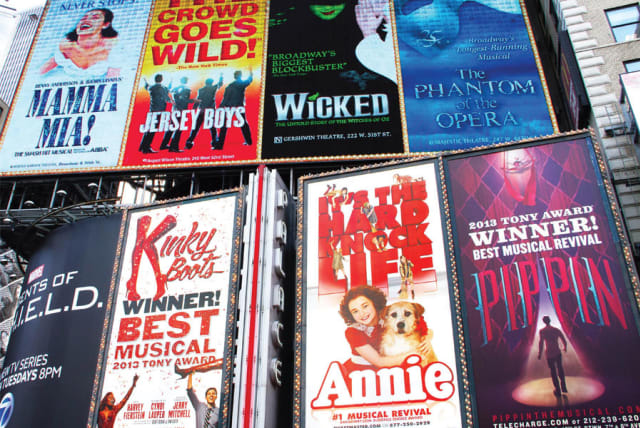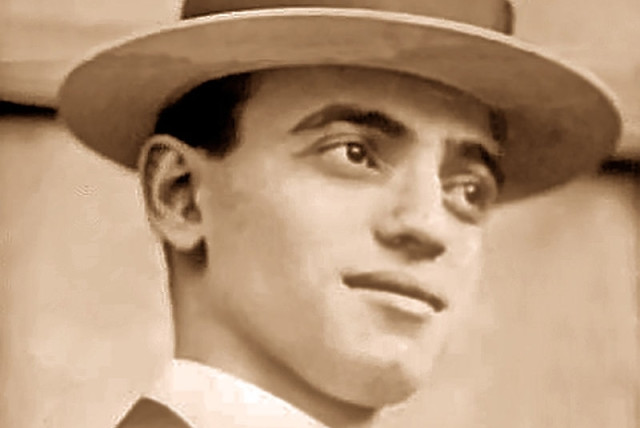Should Jews be out having fun? - opinion

What do I want to do, fritter my time away watching something fun and frivolous? Am I really that shallow? Am I not Jewish? Do I not care about my people?
I found myself in New York for a few hours recently on the tail end of a trip that included talking to various groups about the situation in Israel, when an old friend asked if I’d like to join him and his siblings at a Broadway musical.
“Great,” I thought, “a Broadway musical.” The neon lights, the magic in the air, the spectacular costumes, the electric energy, the exhilarating choreography, the stupendous sets. Sure I’d like to go. Who wouldn’t want to go? It’s been years since I last saw a Broadway musical. Camelot, I think it was.
“What are we going to see?” I asked enthusiastically. “The Lion King? Aladdin? Hamilton? The Wiz? Something upbeat and happy, I hope. I can use upbeat and happy. Who can’t use upbeat and happy?”
“We’re going to go see Parade,” he replied. “You know, the musical about Leo Frank.”
“Leo Frank,” I answered. “You mean, the Leo Frank; that Leo Frank?”
“Yup,” he said. “Wanna come?”
“Let me think about it,” I said, my enthusiasm dampened a bit.
Leo Frank was a Jew from New York wrongly convicted in Atlanta in 1913 of killing a 13-year-old girl in the pencil factory he managed. His death sentence was commuted two years later, but a mob broke into the jail where he was being held, drove him out to Marietta, Georgia, the murdered girl’s hometown, and lynched him. The Anti-Defamation League was formed in the wake of this high-profile case.
“Harlan,” I said to my buddy, “why in the world would I want to pay $130 to sit in the balcony to see a musical about antisemitism? I mean, have you fallen on your head? All you read about is the rise of antisemitism. You go to shul everywhere in the US and meet security guards who remind you of antisemitism. Hamas, Hezbollah, and Iranian antisemites want to kill me and my family in Israel. Why, as entertainment, do I want to see a musical about the lynching of a Jew?
“And, while we’re at it, what kind of music can possibly accompany such a story? Can’t we see something upbeat and happy, something like Sweeney Todd?”
“Nope,” he said. “We got tickets for this. You’re lucky you weren’t here last month. Then we saw Leopolstadt.” Leopolstadt is Tom Stoppard’s play that chronicles the tragic fate of a wealthy Viennese family decimated by the Holocaust.
I sure am sorry I missed that one. Those Jews – I thought while considering my friend’s Broadway show preferences – sure do know how to have fun.
AND THEN I felt guilty.
Feeling guilty about Broadway musicals
Why? Because I should want to see such fare. Because such fare must be performed. Because such fare making the general public aware of antisemitism is good for the Jewish people.
Last February, about a dozen neo-Nazis picketed the theater on opening night where the revival of this play is being staged, so how could I not go? Wasn’t it my responsibility as a concerned and committed Jew to ensure there were bodies in the seats at the Bernard B. Jacobs Theater, to make sure that this musical would continue to be performed and its message seen by those far less aware of antisemitism than I?
What do I want to do, fritter my time away watching something fun and frivolous? Am I really that shallow? Am I not Jewish? Do I not care about my people?
Of course, I care about my people, I thought. But can’t I take a break from all that and go to a Broadway musical once in a blue moon, and not think about the heavy and depressing issues affecting the Jewish world? After all, that escapism is precisely why I was willing to pay so much money to see a Broadway musical in the first place: to be entertained, not to be depressed ruminating once again on subject matter that I worry about constantly.
So there I was, suddenly thrust smack dab on the horns of that eternal Jewish dilemma: torn between what I thought I should do, what I felt obligated to do, and what I actually wanted to do.
In the final scene of the musical – which in the end I did attend because “what I should do” won out – his murderers ask Frank if he has any final words. He does, and poignantly recited the Shema Yisrael prayer before being lynched. It’s a powerful scene. A woman behind me started to sob.
Tell me, is that entertainment? No, that’s heart-wrenching.
DON’T MISUNDERSTAND; I don’t avoid heavy, tragic and often depressing plays, books, movies and documentaries. Were that the case, I could never have seen Romeo and Juliet, read Crime and Punishment, or watched The Elephant Man or Ken Burns’s Vietnam. But those are stories affecting other people and other lands. They don’t hit so close to home.
With so many heart-rending scenes taking place in Israel on a weekly basis, is it necessary – I thought to myself – to go to New York, to a Broadway musical of all places, in search of yet another?
Yet I did because I felt compelled to do so. It’s the same compulsion that motivates Israelis on family vacations in Europe to feel obligated, once there, to visit the local synagogue-turned-museum that usually depicts the tragedy that befell that particular community. Visiting rundown Jewish cemeteries and destroyed Jewish neighborhoods or synagogues in foreign lands is a uniquely Jewish way of traveling.
“How was the musical?” my wife asked when we spoke after the show. “Was it good? Did you enjoy it?”
“It was powerful,” I answered. Then, sounding like my Russian immigrant grandfather, I added: “Who are we to enjoy?”
To which she replied: “If you’re spending $130 for a ticket, you should enjoy. You can get depressed for free.” ■
Jerusalem Post Store
`; document.getElementById("linkPremium").innerHTML = cont; var divWithLink = document.getElementById("premium-link"); if (divWithLink !== null && divWithLink !== 'undefined') { divWithLink.style.border = "solid 1px #cb0f3e"; divWithLink.style.textAlign = "center"; divWithLink.style.marginBottom = "15px"; divWithLink.style.marginTop = "15px"; divWithLink.style.width = "100%"; divWithLink.style.backgroundColor = "#122952"; divWithLink.style.color = "#ffffff"; divWithLink.style.lineHeight = "1.5"; } } (function (v, i) { });

